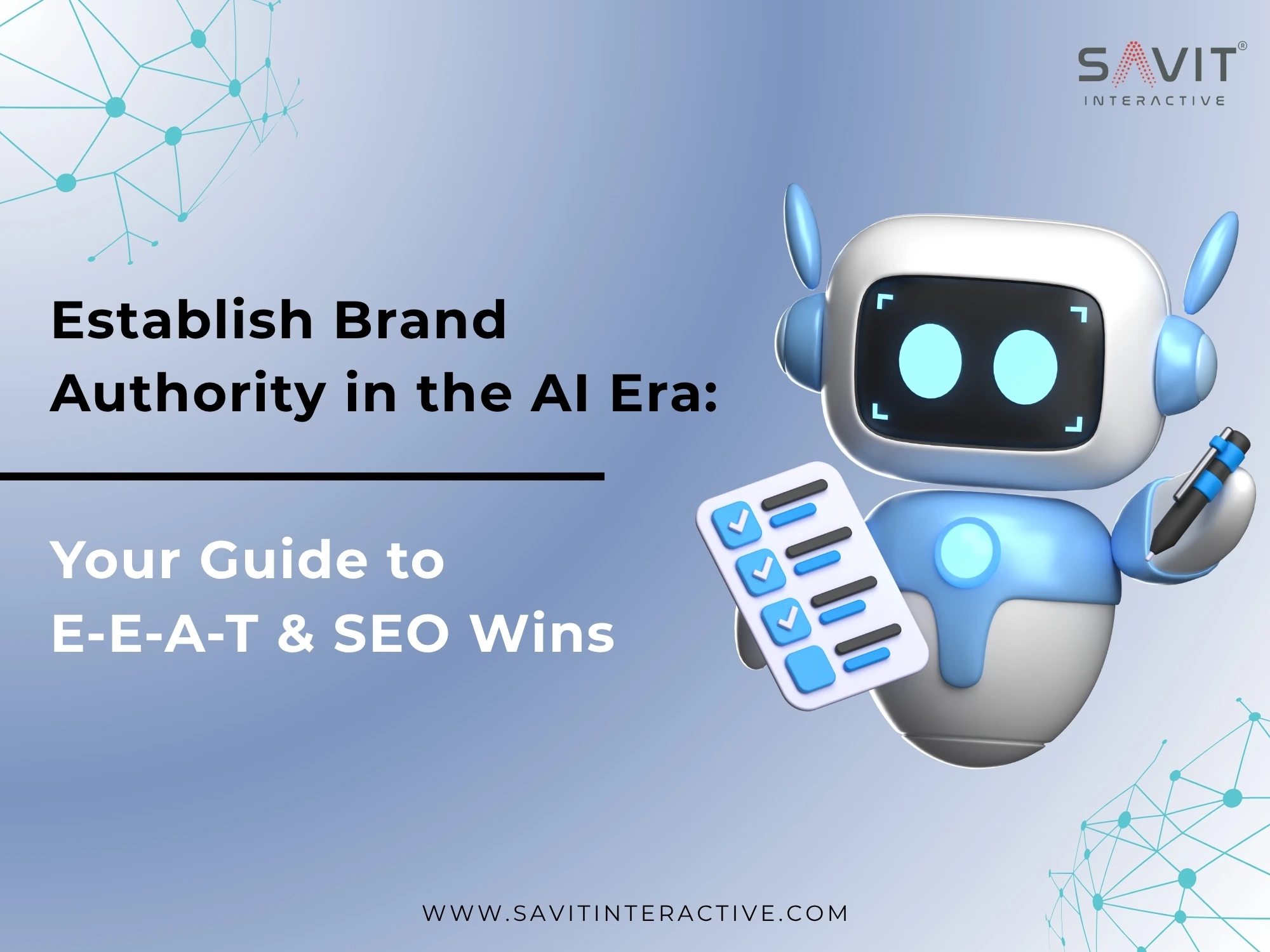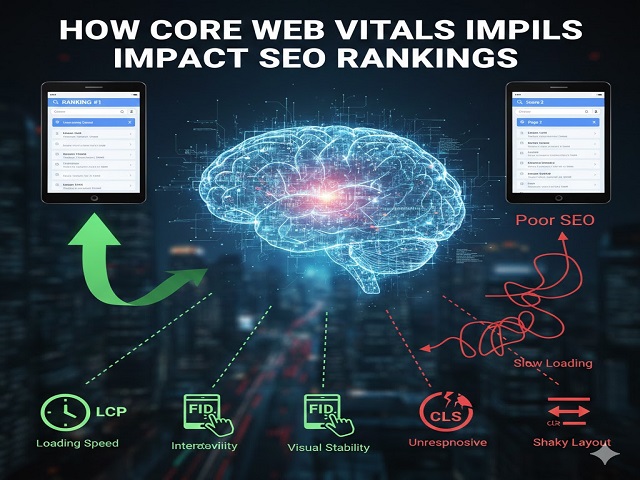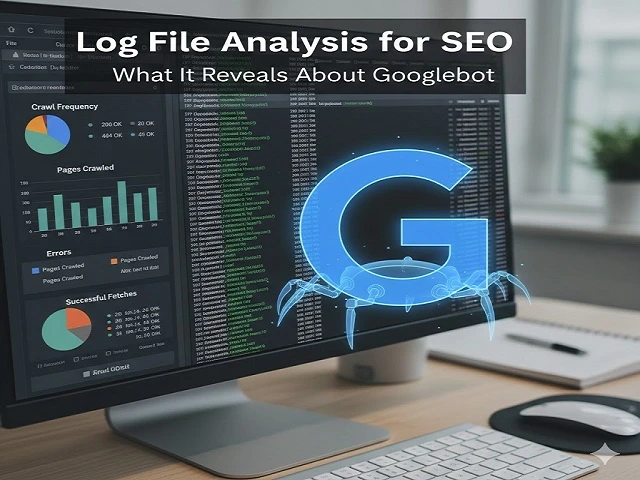Learn how brands can stay visible and build trust in AI-powered search using E-E-A-T and smart SEO strategies.
Search behavior is shifting. With features like AI-generated answers and AI Mode in Search becoming part of how people access information, brands have less control over how their content is shown or even credited.
E-E-A-T (Experience, Expertise, Authoritativeness, Trustworthiness) plays a critical role in this new environment. It helps search engines determine which content can be trusted, especially in areas that impact people’s money, health, or safety, such as YMYL (Your Money or Your Life) queries.
This blog explains how to strengthen your content using E-E-A-T principles, why it matters in AI-driven search, and what actions can help your brand stay visible and credible. Whether managing SEO for a business or building a long-term content strategy, these insights can help you stay ahead.
What Is E-E-A-T & Why It Matters More in the AI Era
E-E-A-T stands for Experience, Expertise, Authoritativeness, and Trustworthiness, four key factors Google uses to evaluate the quality of content, especially in sensitive or high-impact topics.
These elements help search engines determine whether a page is accurate, reliable, and worth showing in search results. Each one plays a role:
- Experience proves the content is based on real, first-hand knowledge
- Expertise reflects the creator’s subject understanding
- Authoritativeness shows that the source is recognized and respected
- Trustworthiness confirms that users can rely on the content’s accuracy and safety
In the age of AI-driven search, these signals matter even more. Tools that generate or summarize content like Google’s AI-generated answers often favor trusted, expert-backed sources. If your content lacks clear E-E-A-T, it may be overlooked or misrepresented, especially in YMYL (Your Money or Your Life) queries, where trust is non-negotiable.
For brands aiming to stay visible and credible in AI-powered search, E-E-A-T is no longer optional – it’s essential.
How AI-Driven Search Is Changing Content Discovery
The way people discover information online is rapidly evolving. With the rollout of features like AI Mode in Search, users increasingly rely on summaries and AI-generated answers rather than clicking through multiple websites.
These tools don’t just present links – they analyze content across the web and generate direct responses. While this can improve user convenience, it also reduces visibility for brands that don’t appear as trusted sources in these summaries.
For marketers and businesses, this shift means less control over how content is presented and fewer chances to attract more clicks. If content isn’t considered reliable or doesn’t show clear signals of E-E-A-T, it might not be featured.
To stay discoverable, brands must focus on producing high-quality, verifiable content that AI systems can confidently pull from, especially as AI-driven search becomes the new standard.
Challenges for Brands in the AI Era
As search engines increasingly rely on AI-generated answers, brands face new challenges, especially regarding visibility, credibility, and content control.
- Reduced visibility and clicks
AI search tools often summarize content without linking directly to the source. Fewer users actually visit the brand’s website, even if the content contributed to the AI’s response.
- Loss of attribution
When content is pulled into an AI-generated search result, it’s not always clear who the source is. This weakens brand recognition and may limit the return on content investment.
- Increased competition in YMYL categories
Trust becomes critical for topics involving health, finance, or legal advice. A brand that doesn’t show strong E-E-A-T signals risks being filtered out of YMYL (Your Money or Your Life) queries altogether.
- Greater pressure to prove trustworthiness
AI tools prioritize clear, verifiable information. Brands that lack author bios, credentials, or transparent sources may be deprioritized even if their content is factually accurate.
To compete in this environment, brands must go beyond just publishing good content. They need to demonstrate trust, expertise, and consistency across every touchpoint.
Why E-E-A-T Is Essential for YMYL Queries
Google emphasizes YMYL (Your Money or Your Life) queries – topics that affect a person’s health, finances, safety, or well-being. The need for credible, expert-backed content becomes critical when these queries are involved.
Here’s why E-E-A-T matters even more for YMYL topics:
- YMYL content requires higher accuracy
Misinformation in finance, healthcare, or law can lead to serious harm. That’s why search engines demand verified facts and trustworthy authors for such queries.
- Expertise isn’t optional – it’s expected
Google favors content written by professionals or people with real-world experience in the subject. Generic or AI-written content without clear expertise may get filtered out.
- Trust signals improve visibility in AI-generated answers
AI tools prioritize content that’s easy to verify. This includes citing sources, listing credentials, and linking to reliable references – all parts of strong E-E-A-T.
- Author transparency builds confidence
Clear author bios, credentials, and organization details increase the chances of content ranking for YMYL queries and being featured in AI-generated search results.
- Weak E-E-A-T means missed opportunities
Even well-written content may not rank or be used in AI-driven searches if it lacks authority. For brands in sensitive industries, this could mean losing trust and traffic.
Proven Ways to Build E-E-A-T in an AI-First Search World
As AI-driven search reshapes how content is found and ranked, building E-E-A-T into your content is no longer a recommendation — it’s a requirement. Here are key ways brands can demonstrate strong signals of experience, expertise, authority, and trust:
- Highlight real-world experience
Use first-hand insights, case studies, or personal examples that show the content creator has lived or worked through the topic, especially valuable for product reviews or service explanations.
- Showcase author credentials and bios
Add detailed author bios with qualifications, job titles, and relevant background. Link to LinkedIn or other profiles when possible to increase transparency and credibility.
- Use structured data for E-E-A-T signals
Implement schema markup (like author, organization, review, or FAQ) to help search engines identify trustworthy content and present it properly in AI-generated search results.
- Earn high-quality backlinks
Content that’s cited by respected websites or media outlets strengthens your authority. Focus on original research, expert commentary, or unique perspectives to earn these links naturally.
- Keep About, Contact, and Team pages updated
These pages offer trust signals that both users and search engines look for. Display full contact details, team members’ roles, and links to relevant credentials or affiliations.
- Refresh content regularly
Outdated or factually incorrect content can harm your perceived expertise. Review and update key pages, especially those under YMYL queries, to maintain accuracy and trust.
- Support claims with credible sources
Link out to trusted studies, government data, or expert publications to reinforce the validity of your content. This improves both authority and user confidence.
Strategies for Effective Content in AI-Generated Search Results
With the rise of AI-generated search results, content needs to do more than rank — it must be structured in a way that AI tools can easily interpret and summarize. Here are content strategies that improve visibility and performance in AI-enhanced search:
- Use clear and structured formatting
Organize content into sections with headings, bullet points, and concise paragraphs. Content that is structured effectively allows AI to scan, extract, and highlight information in quick answers more easily.
- Answer common questions directly
Create content that addresses FAQs, “how-to” queries, or definitions in a straightforward way. These formats often get picked up in AI-generated answers and featured snippets.
- Include unique perspectives or personal experience
AI tools can’t replicate human insights. Add original thoughts, first-hand experience, or brand stories to provide value that algorithm-generated summaries can’t match.
- Optimize for conversational and voice-style queries
Many AI systems prioritize natural language. Use simple, question-based headings like “What is…?”, “How does…?”, or “Why should…” to align with AI-driven search behavior.
- Provide quick takeaways alongside in-depth content
Balance depth with clarity. Use summaries, key points, or content boxes that give readers (and AI tools) quick, scannable information up front, then expand with detail.
- Focus on topical authority, not just keywords
Cover a topic thoroughly through clusters of related content rather than isolated blog posts. AI systems reward brands that demonstrate depth and consistency on a subject.
Tracking Performance in AI-Driven Search
Traditional SEO metrics still matter, but with the rise of AI Mode in Search and AI-generated answers, brands need to look at new signals to understand how their content is performing. Here’s how to track visibility and impact in an AI-powered search landscape:
- Monitor search visibility using Search Console
Google Search Console continues to offer insights into clicks, impressions, and queries. Look for changes in branded and non-branded visibility, especially after updates to AI features.
- Track brand mentions across AI snippets
Use tools like Semrush, BrandMentions, or SEOClarity to monitor how often your brand or content is referenced in AI-generated search results, even if it’s not hyperlinked.
- Analyze click-through drops on top-performing pages
Pages with high rankings but reduced traffic may be affected by AI answers replacing traditional clicks. Compare page-level CTRs over time to spot these shifts.
- Study user behavior in analytics
Measure engagement, bounce rate, and time on page. Content featured in AI answers may attract fewer visits, but the visits it gets should be high-intent.
- Check for inclusion in featured snippets and FAQs
These SERP features often feed AI responses. Use tools like Ahrefs or Semrush to track when your content appears in featured formats.
- Evaluate E-E-A-T signals across your site
Audit your About, Author, Contact, and Review pages to ensure trust signals are present, updated, and consistent, especially if your industry falls under YMYL queries.
Building Trust in an AI-Led Landscape
As AI reshapes how people search and interact with content, brands that focus on trust and credibility will stand out. E-E-A-T is no longer just a ranking factor, it’s a brand necessity. With AI summarizing content and limiting visibility to only the most trusted sources, demonstrating real experience, expertise, and authority is what keeps content visible, clickable, and reliable.
Adapting to this shift requires more than basic optimization; it calls for a content strategy built on authenticity, structure, and long-term trust. That’s where thoughtful SEO guidance becomes invaluable. Savit Interactive helps brands create trustworthy, search-optimized content that aligns with today’s evolving SEO standards. As a results-driven digital agency, they bring proven expertise in organic strategy, content architecture, and technical SEO, enabling businesses to compete and grow in an AI-first search world.
Frequently Asked Questions
1. What does E-E-A-T stand for, and why is it important in SEO today?
E-E-A-T stands for Experience, Expertise, Authoritativeness, and Trustworthiness. These principles help search engines evaluate content quality. In a time when AI-generated responses compile search results, content that exhibits robust E-E-A-T signals is more likely to be highlighted and deemed trustworthy.
2. In what ways does AI influence search rankings and the visibility of content?
Search engines now utilize AI-driven search models to comprehend and deliver content. Users may see AI summaries or answers before clicking on any link. To be included in those summaries, a brand must show credibility through trusted content, author signals, and clear topical authority.
3. What are YMYL queries, and why do they matter more with AI search?
YMYL (Your Money or Your Life) queries relate to subjects that impact an individual’s health, finances, or safety. Google places this content under stricter scrutiny. With AI-generated answers, the need for accurate, credible, and experience-backed content becomes even more critical for ranking.
4. Is E-E-A-T a ranking criterion or merely a guideline?
Technically, E-E-A-T is not a direct ranking factor like page speed or mobile usability. However, it’s used in Google’s quality evaluations and indirectly affects rankings, especially as AI Mode in Search highlights only the most credible content. It plays a crucial role in long-term SEO success.
5. Can AI-generated content rank well in SEO?
AI-generated content can support the content creation process, but it typically lacks the human insight, originality, and context that search engines value most. For content to rank well, especially in AI-driven search environments, it must demonstrate (E-E-A-T) Experience, Expertise, Authoritativeness, and Trustworthiness.




